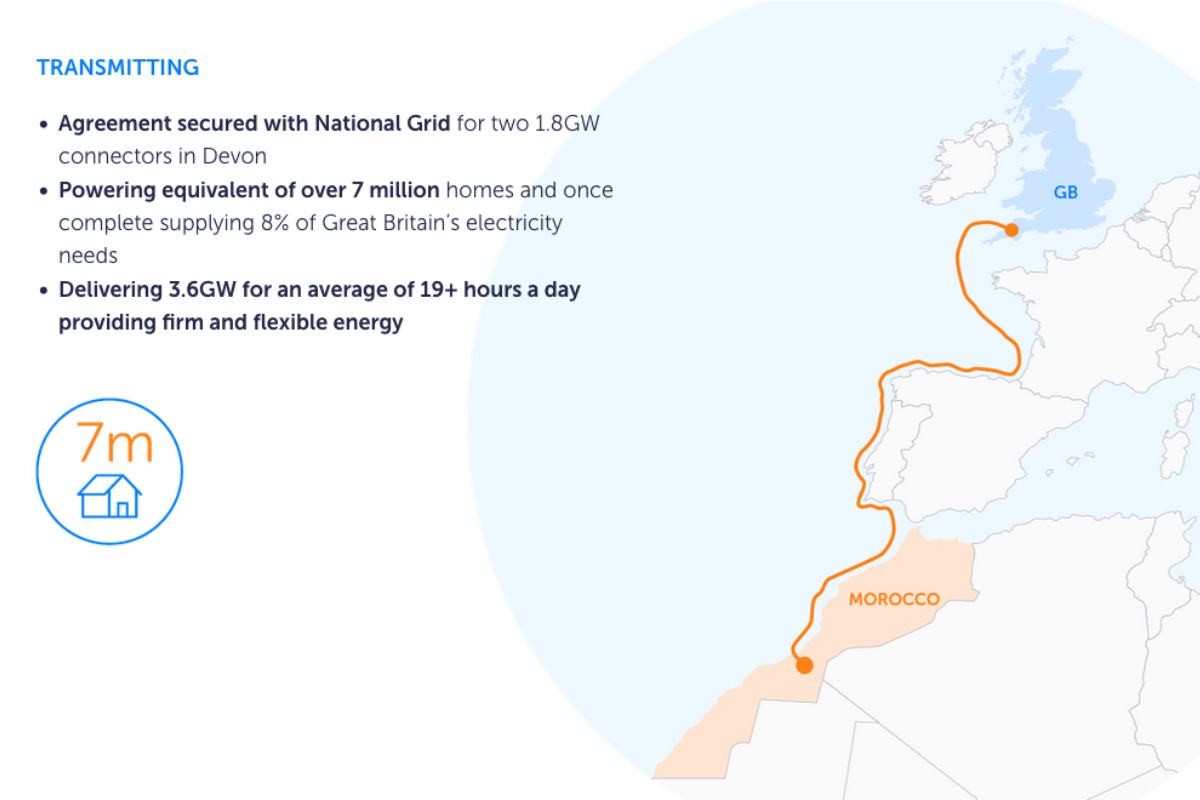The Government has opted against financially backing an interconnector that would connect the UK and Morocco, despite the project having been previously seen as nationally significant under the previous Conservative Government.
In deciding against offering the Xlinks interconnector a bespoke, 25-year Contract for Difference (CfD) that would have guaranteed a minimum price for electricity carried 3,800 km from solar and wind farms in Morocco, Energy Minister Michael Shanks noted that supporting homegrown projects would ‘deliver similar decarbonisation goals’, while keeping more of the economic benefit, jobs, and supply chain spend inside of the UK.
What is Xlinks?
Xlinks is the name given to the proposed £25 billion interconnector between the UK and Morocco, and had it gone ahead, it could have supplied up to 8% of Britain’s electricity – enough for about seven million homes.
It would have utilised four high-voltage direct-current (HVDC) cables running beneath the Atlantic, as well as in the territorial waters of Portugal, Spain and France. The company claimed the link would cut wholesale prices by 9% in its first year, trim power-sector CO2 by around 10% and bolster security of supply by smoothing out periods when British wind and solar output falter.
Early-stage backing came from Abu Dhabi’s TAQA, TotalEnergies, Octopus Energy and other investors, and more than £100 million had already been spent on development work. Xlinks insisted no upfront Treasury funding was required – only long-term price certainty through the CfD mechanism.
Sir Dave Lewis, Xlinks’ Chair and former Tesco Chief Executive, said the verdict was “hugely surprising and bitterly disappointing.” He warned that the UK was walking away from a “large-scale renewable energy project” capable of lowering bills, injecting £5 billion into green industries and arriving “significantly sooner and at lower cost than the nuclear alternative.”
Lewis added, “We developed this project to rapidly realise the potential of long-distance electricity generation and connection for the UK and Morocco – potential that was recognised by the UK in 2023, when it was designated as a nationally significant project.
“The project requires no upfront government investment and offered a highly competitive CfD strike price. It would reduce wholesale electricity prices by over 9% in its first year; bring in £20bn of socio-economic value, including a £5bn injection into the UK’s green industries; provide 8% of the UK’s electricity needs at a time when demand is rocketing; cut power sector CO₂ emissions by c.10% in its first year; and increase energy security through increased diversity of supply and reduced reliance on imported gas.
“Furthermore, it would address the challenge of sharp drops in UK power generation when the wind isn’t blowing or the sun isn’t shining. It would do this at significantly lower cost than the nuclear alternative and be connected to the grid much sooner.
“The international investment community identified the potential of the opportunity. Over £100m from leading energy sector players has already been spent on project development, and demand from lenders to participate in the construction phase is greater than we require.
“Most importantly, Morocco – a world leader in renewable energy – recognises the strategic value of interconnections. We have been continuously impressed by the vision, framework and environment that Morocco has put in place to foster international energy collaboration through supporting innovative initiatives, as part of its long-term vision to lead the international community’s efforts towards net zero.
“Ultimately, we have no choice but to accept DESNZ’s decision. We are now working to unlock the potential of the project and maximise its value for all parties in a different way.”
Can Xlinks still go ahead?
While the ruling removes the prospect of a UK-backed CfD, it is possible that Xlinks could still pursue power-purchase agreements with private offtakers or re-pitch the scheme to other European markets keen to diversify clean-energy imports.
According to Lewis, Xlinks is now working to “unlock the potential of the project and maximise its value for all parties in a different way.” That means that while the UK Government has ruled out financial backing, the project could still see the light of day yet.

